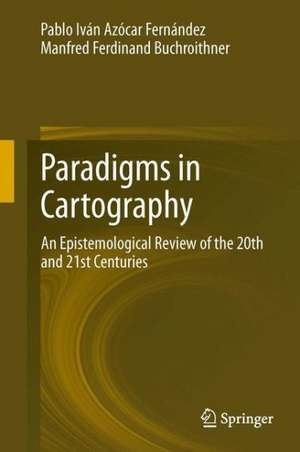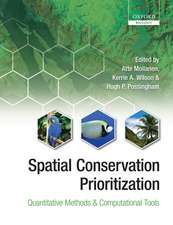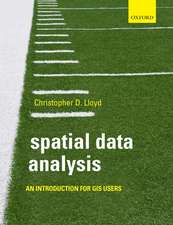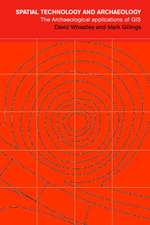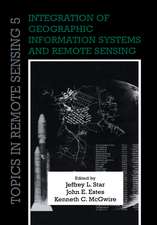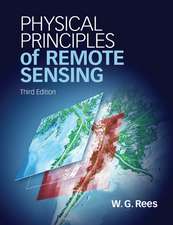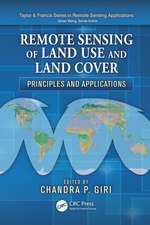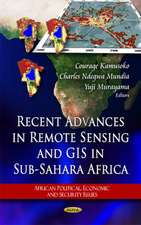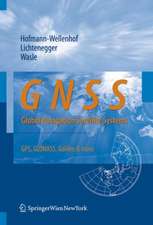Paradigms in Cartography: An Epistemological Review of the 20th and 21st Centuries
Autor Pablo Iván Azócar Fernández, Manfred Ferdinand Buchroithneren Limba Engleză Hardback – 21 aug 2013
Some main philosophers who have been influential for contemporary thinking such as Immanuel Kant, Ludwig Wittgenstein, Karl Popper and Bertrand Russell, are considered. None of these philosophers wrote about cartography directly (excepting Kant), but their philosophies are related to cartography and mapping issues. The book also analyses the concept of paradigm or paradigm shift coined by Thomas Kuhn, who applied it to the history of science. Different cartographic trends that have arisen since the second half of the twentieth century are analysed according to this important concept which is implicit inside the scientific or disciplinary communities.
Further, the authors analyse the position of cartography in the context of the sciences and other disciplines, adopting a positivistic point of view. Additionally, they review current trends in cartography and mapping in the context of information and communication technologies in a post-modernistic or post-structuralistic framework. Thus, since the 1980s and 1990s, new mapping concepts have arisen which challenge the discipline’s traditional map conceptions.
| Toate formatele și edițiile | Preț | Express |
|---|---|---|
| Paperback (1) | 634.18 lei 6-8 săpt. | |
| Springer Berlin, Heidelberg – 25 aug 2015 | 634.18 lei 6-8 săpt. | |
| Hardback (1) | 639.73 lei 6-8 săpt. | |
| Springer Berlin, Heidelberg – 21 aug 2013 | 639.73 lei 6-8 săpt. |
Preț: 639.73 lei
Preț vechi: 752.63 lei
-15% Nou
Puncte Express: 960
Preț estimativ în valută:
122.41€ • 127.81$ • 101.31£
122.41€ • 127.81$ • 101.31£
Carte tipărită la comandă
Livrare economică 05-19 aprilie
Preluare comenzi: 021 569.72.76
Specificații
ISBN-13: 9783642388927
ISBN-10: 3642388922
Pagini: 250
Ilustrații: XVII, 150 p.
Dimensiuni: 155 x 235 x 17 mm
Greutate: 0.4 kg
Ediția:2014
Editura: Springer Berlin, Heidelberg
Colecția Springer
Locul publicării:Berlin, Heidelberg, Germany
ISBN-10: 3642388922
Pagini: 250
Ilustrații: XVII, 150 p.
Dimensiuni: 155 x 235 x 17 mm
Greutate: 0.4 kg
Ediția:2014
Editura: Springer Berlin, Heidelberg
Colecția Springer
Locul publicării:Berlin, Heidelberg, Germany
Public țintă
ResearchCuprins
Philosophy, Epistemology and Cartography.- A Philosophical Framework Applied to Cartography.- Paradigms in the History of Science.- Tendencies in Contemporary Cartography.- Critical Cartography in the Context of Postmodernism.- Post-representational Cartography.- Possibility of a Paradigm in Cartography.- Scopes of Paradigms in Cartography.- Conclusion.
Textul de pe ultima copertă
In this book the main trends, concepts and directions in cartography and mapping in modernism and post-modernism are reviewed. Philosophical and epistemological issues are analysed in cartography from positivist-empiricist, neo-positivist and post-structuralist stances. In general, in cartography technological aspects have been considered as well as theoretical issues. The aim is to highlight the epistemological and philosophical viewpoint during the development of the discipline.
Some main philosophers who have been influential for contemporary thinking such as Immanuel Kant, Ludwig Wittgenstein, Karl Popper and Bertrand Russell, are considered. None of these philosophers wrote about cartography directly (excepting Kant), but their philosophies are related to cartography and mapping issues. The book also analyses the concept of paradigm or paradigm shift coined by Thomas Kuhn, who applied it to the history of science. Different cartographic trends that have arisen since the second half of the twentieth century are analysed according to this important concept which is implicit inside the scientific or disciplinary communities.
Further, the authors analyse the position of cartography in the context of the sciences and other disciplines, adopting a positivistic point of view. Additionally, they review current trends in cartography and mapping in the context of information and communication technologies in a post-modernistic or post-structuralistic framework. Thus, since the 1980s and 1990s, new mapping concepts have arisen which challenge the discipline’s traditional map conceptions.
Some main philosophers who have been influential for contemporary thinking such as Immanuel Kant, Ludwig Wittgenstein, Karl Popper and Bertrand Russell, are considered. None of these philosophers wrote about cartography directly (excepting Kant), but their philosophies are related to cartography and mapping issues. The book also analyses the concept of paradigm or paradigm shift coined by Thomas Kuhn, who applied it to the history of science. Different cartographic trends that have arisen since the second half of the twentieth century are analysed according to this important concept which is implicit inside the scientific or disciplinary communities.
Further, the authors analyse the position of cartography in the context of the sciences and other disciplines, adopting a positivistic point of view. Additionally, they review current trends in cartography and mapping in the context of information and communication technologies in a post-modernistic or post-structuralistic framework. Thus, since the 1980s and 1990s, new mapping concepts have arisen which challenge the discipline’s traditional map conceptions.
Caracteristici
First book about this topic Investigates the position of cartography in the context of sciences Shows current tendencies in cartography in the context of information and communication technologies Includes supplementary material: sn.pub/extras
